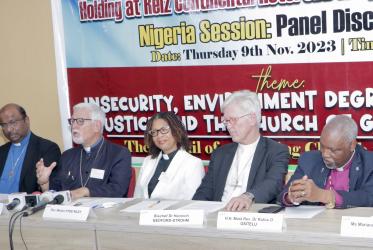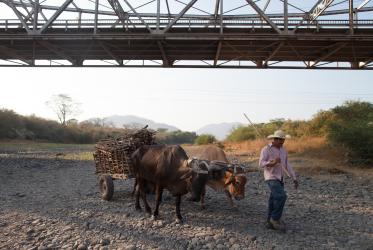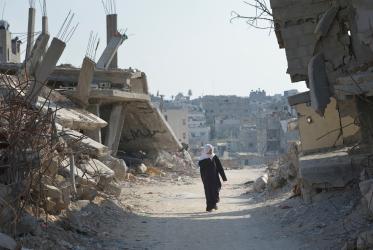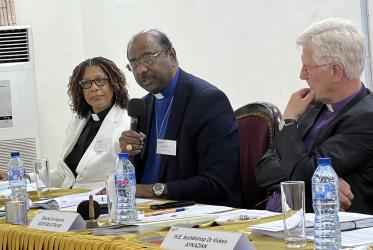- The civil war in Sri Lanka, which has continued for over twenty-five years, raises fresh concerns as the prospects for the resumption of the peace process has fallen apart once again. The parties to the conflict, in spite of international mediation, have not reached any agreement that would lead to the resolution of this protracted conflict. On 2 January 2008, the Government of Sri Lanka (GoSL) withdrew from the ceasefire agreement with the Liberation Tigers of Tamil Ealam (LTTE). Since then the fighting has intensified to a degree worse than it was prior to the 2002 ceasefire agreement. The intensification of the war in the northern part of the country put people under tremendous hardships. Gross violations of human rights, disappearances and killings of noncombatants are on the rise. Thousands of civilians are internally displaced and are at tremendous risk due to the fighting between the military and the LTTE in the LTTE occupied area of Vanni. Unarmed and trapped in this war zone, thousands of civilians, including children, are caught in the crossfire. The people are under pressure from both sides of the conflict to support its respective strategy and actions. This further aggravates the people's suffering and fear. The absence of effective mechanisms to receive and investigate complaints of human rights violations, contributes to the helplessness and vulnerability of the people. Although concerns about this situation have been expressed by UN agencies, the European Union and others, there has been no positive response from the government.
- Reports from humanitarian agencies, which were operational in the Northern Province of Sri Lanka, have indicated that the escalation in the fighting between the government forces and the LTTE has created a new humanitarian crisis with serious consequences for the survival of innocent civilians. Recently, the government has asked all humanitarian workers to leave the LTTE controlled region, for their own safety, as the military plans a major offensive there. The displaced civilians in Vanni and other places in the North are finding it extremely difficult to cope with the situation as they are forced to live without basic amenities. The closure of the main highway between the north and the south of the country, coupled with government regulations, have restricted the flows of food, medical supplies, materials for temporary shelter, water and sanitation facilities to this region. The humanitarian costs of the war are increasing day by day. As the deteriorating situation of the country continues to tear apart the lives of millions of Sri Lankans, a sense of hopelessness permeates the country.
- The protection of the rights of all its citizens and in particular of unarmed civilians, including children and the elderly, is a primary responsibility of any government even at times of war. In this context, the GoSL, a signatory to the Geneva Convention of 1949, cannot overlook its legal obligations under International Humanitarian Law and its moral obligation to comply with the provisions of the 1977 additional protocols. Emergency measures taken by a government should not exceed the limitations established by International Law. The welfare of the civilian population must not be compromised for military exigencies. The practice of the LTTE of forcibly recruiting civilians and deploying them in civilian areas places non-combatants at the risk of being attacked by the military. This is further contributing to the increased numbers of causalities. Restrictions are placed in the path of UN agencies, other humanitarian agencies as well as of countries involved in trying to negotiate for lasting peace in Sri Lanka. As the situation in Sri Lanka worsens, the international community must urgently find ways of engaging all parties and resolve the humanitarian crisis as soon as possible. The situation in the country today, warrants the immediate attention of the international community to encourage and assist the GoSL and the LTTE to resume the peace talks.
- The churches in Sri Lanka have been playing a proactive role in peace building ever since the country slipped into this war. Interreligious initiatives taken by the Sri Lankan churches in cooperation with civil society organizations in the country have helped to mobilize people from all walks of life, including the international community, to be concerned about peace and reconciliation in Sri Lanka. The National Christian Council in Sri Lanka, through its Commission on Justice and Peace, has been contributing significantly to peace building efforts, even at the grass root level, in the conflict affected areas. Sri Lankan church leaders recently urged the warring parties to invite international humanitarian agencies to set up peace zones in the conflict affected areas. Over the years, the World Council of Churches (WCC) has been accompanying the Churches in Sri Lanka in their peace and reconciliation ministry. In August 2007, a Living Letters team, in the context of the Decade to Overcome Violence, visited the country to express the solidarity and concern of the global ecumenical family. As part of its global advocacy initiatives, the WCC's UN Advocacy Week programme, which will be held from 17-24 November 2008 in New York, will focus peace and reconciliation in Sri Lanka also as a priority concern.
- While the worldwide ecumenical community seeks to stand in solidarity with the churches in Sri Lanka and their people, we are reminded of St. Paul's message that "we are one body, and when one part of the body suffers all suffer with it (1 Cor. 12: 26). Our Lord Jesus Christ calls us to be peacemakers and it is this calling that compels us to continue our commitment to peace and reconciliation in Sri Lanka.
The executive committee of the World Council of Churches, meeting in Lübeck, Germany from 22-26 September 2008, therefore:
A. Expresses its deep concern about the escalation of the war and all kinds of armed violence in the country.
B. Condemns the killings of non-combatants and all other forms of human rights violations by government forces and the Liberation Tigers of Tamil Ealam;
C. Calls on the warring parties to adhere to International Humanitarian Law, the UN's Guiding Principles on Internal Displacement and other humanitarian norms; and to receive and investigate complaints of human rights violations as required by law locally and internationally:
D. Appeals to the international community to put pressure on the warring parties to respect the relevant provisions of International Humanitarian Law to ensure that all civilians in conflict affected regions in the country are safe from any forms of threat to their life, inhuman treatment by the armed forces of either side, taking of hostages and assaults on personal dignity;
E. Urges the government of Sri Lanka and the Liberation Tigers of Tamil Ealam to jointly invite and assist the International Committee of the Red Cross and the UN High Commissioner for Refugees to set up peace corridors and peace zones for the safety of civilians in the war zones in the country;
F. Urges the government of Sri Lanka to provide all civilians adequate access to basic amenities for their survival including supplies of food, water, fuel, and medicine;
G. Urges the government of Sri Lanka to provide churches, religious groups and civil society organizations access to the northern provinces in order to be engaged in humanitarian work;
H. Urges the government of Sri Lanka to provide adequate access for the media to report on the conditions of life of the people in these provinces;
I. Requests churches and the ecumenical community all over the world to support the efforts of the international community to contribute to a process for the peaceful resolution to the Sri Lankan conflict;
J. Commends the churches in the country that are working diligently and with courage to secure peace with justice, and urges the WCC member churches and the ecumenical Community to uphold the people and churches of Sri Lanka in prayer;
K. Reiterates our earlier call to the government of Sri Lanka and the Liberation Tigers of Tamil Ealam to resume peace negotiation through international mediators.





